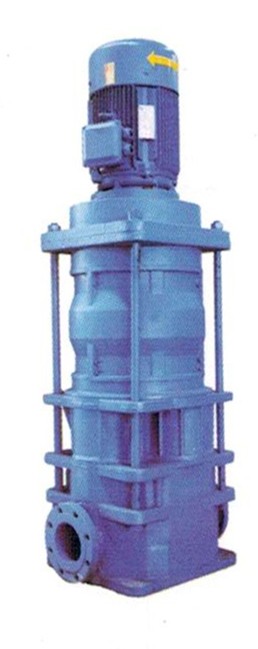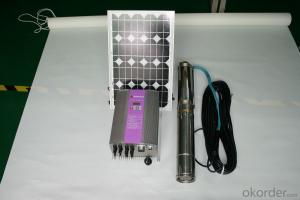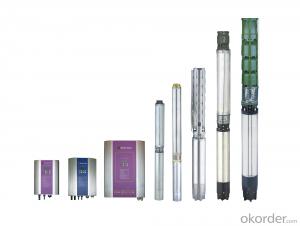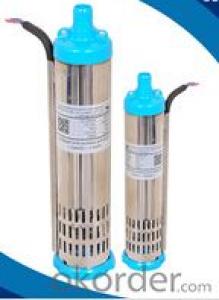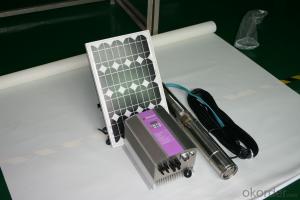Solar Pump for Irrigation L3D-90-80
- Loading Port:
- China Main Port
- Payment Terms:
- TT OR LC
- Min Order Qty:
- -
- Supply Capability:
- 300 sets /month
OKorder Service Pledge
OKorder Financial Service
You Might Also Like
Product description:
Product: Solar water pump
Model:L3D-90-80
Appilication:
surface pump
for surface water of pond, river, lake
for irrigation of a big farm with 50000 m2 on the top of a hill
Product specification:
flow rate:90m3/ hour, 630m3/day.
lift: 10m-80m
pump diameter: 610mm
Pump installed on the ground, outlet to the water surface:4m
with AC motor, motor power:22kW
but only need solar power:20kW(while Grundfos pump needs at least 45kW solar power, our pump can save more than 50% solar panel power,save USD15000 cost for solar panel per set.
Material:
Pump inside: stainless steel and wearable nylon,it enables our solar pump to have 10 years sevice life.
Motor : AC motor, 380V , three phase , 50Hz. The pump also can connect with grid power directly.
Certification:
3 International patent
ISO9001
CE
Warranty:2 years
- Q: How does a solar pump handle water source contamination from nearby industries?
- A solar pump does not have the capability to directly handle water source contamination from nearby industries. However, it can be integrated with appropriate filtration and purification systems to mitigate the effects of contamination and ensure safe water supply.
- Q: Can a solar pump be used for water supply in mining operations?
- Yes, a solar pump can be used for water supply in mining operations. Solar pumps are an efficient and sustainable option as they utilize renewable energy from the sun to power the pump. They can be used to extract water from wells, rivers, or other water sources, providing a reliable water supply for mining operations. Additionally, solar pumps are easy to install, require minimal maintenance, and can be cost-effective in the long run, making them suitable for remote mining sites.
- Q: How does a solar pump handle water source contamination from chemical spills?
- A solar pump does not specifically handle water source contamination from chemical spills. However, it can be equipped with additional water treatment systems such as filters or UV disinfection units that help remove or neutralize contaminants in case of chemical spills.
- Q: Can a solar pump be used for golf course irrigation?
- Yes, a solar pump can be used for golf course irrigation. Solar pumps use energy from the sun to power the pump, making them a sustainable and cost-effective option for irrigating large areas such as golf courses. They can provide sufficient water flow and pressure to meet the irrigation needs of the golf course, while also reducing reliance on traditional energy sources.
- Q: How does a solar pump help in promoting sustainable agriculture?
- A solar pump helps in promoting sustainable agriculture by providing a reliable and renewable source of water for irrigation. It eliminates the need for costly and polluting diesel or electric pumps, reducing greenhouse gas emissions and dependence on fossil fuels. Additionally, solar pumps are low maintenance, affordable, and can be easily installed in remote areas, enabling farmers to efficiently water their crops and improve agricultural productivity while preserving the environment.
- Q: How does a solar pump handle water source contamination from chemical manufacturing?
- A solar pump alone cannot handle water source contamination from chemical manufacturing. It is primarily designed to pump water using solar energy. However, to address contamination issues, additional water treatment methods or filtration systems would be necessary to remove or neutralize the chemicals.
- Q: Do solar pumps require regular maintenance?
- Yes, solar pumps require regular maintenance to ensure optimal performance and longevity. This may include cleaning the solar panels to maximize sunlight absorption, checking and adjusting the pump's settings, inspecting and replacing worn-out parts, and monitoring the overall system for any issues. Regular maintenance helps to prevent breakdowns, improve efficiency, and extend the lifespan of solar pumps.
- Q: How does a solar pump handle water quality issues?
- A solar pump does not directly handle water quality issues. However, it can be used in conjunction with appropriate filtration systems or water treatment methods to address water quality concerns.
- Q: Can a solar pump be used for hydroponics or greenhouse irrigation?
- Yes, a solar pump can be used for hydroponics or greenhouse irrigation. Solar pumps are a sustainable and cost-effective solution for providing water to plants in hydroponics systems or greenhouses. They harness energy from the sun to power the pump, eliminating the need for electricity or fuel. This makes them an environmentally friendly option, especially in remote areas where access to electricity may be limited. Additionally, solar pumps can be easily integrated into existing irrigation systems, ensuring efficient water distribution for optimal plant growth.
- Q: Can a solar pump be used for sewage or wastewater treatment?
- Yes, a solar pump can be used for sewage or wastewater treatment. Solar pumps are commonly used in various applications, including agricultural, residential, and industrial purposes. In the case of sewage or wastewater treatment, solar pumps can be utilized to transfer or circulate the sewage or wastewater within the treatment system. Solar pumps operate by converting solar energy into electrical energy, which is then used to power the pump. This makes them an environmentally friendly and cost-effective option for sewage or wastewater treatment systems, as they do not rely on fossil fuels or electricity from the grid. Solar pumps can be used to transport sewage or wastewater from one stage of the treatment process to another, such as transferring it from the settling tank to the filtration unit or pumping it to the disinfection stage. They can also be used to recirculate the wastewater within the treatment system to ensure adequate mixing and contact time with the treatment chemicals or biological agents. Furthermore, solar pumps can be integrated with other components of a wastewater treatment system, such as solar-powered aerators for oxygenation or solar-powered UV disinfection systems. This allows for a complete solar-powered solution for sewage or wastewater treatment, reducing reliance on traditional energy sources and minimizing the carbon footprint of the treatment process. However, it is important to note that the design and sizing of a solar pump for sewage or wastewater treatment should be done carefully, considering factors such as the required flow rate, head pressure, and the specific requirements of the treatment system. Additionally, regular maintenance and monitoring of the solar pump system are essential to ensure optimal performance and longevity.
Send your message to us
Solar Pump for Irrigation L3D-90-80
- Loading Port:
- China Main Port
- Payment Terms:
- TT OR LC
- Min Order Qty:
- -
- Supply Capability:
- 300 sets /month
OKorder Service Pledge
OKorder Financial Service
Similar products
Hot products
Hot Searches
Related keywords

